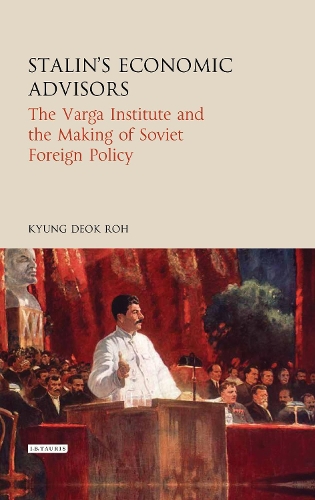
Stalin's Economic Advisors: The Varga Institute and the Making of Soviet Foreign Policy
(Hardback)
Publishing Details
Stalin's Economic Advisors: The Varga Institute and the Making of Soviet Foreign Policy
By (Author) Kyung Deok Roh
Bloomsbury Publishing PLC
I.B. Tauris
28th February 2018
United Kingdom
Classifications
Tertiary Education
Non Fiction
Economic history
International economics
International relations
Central / national / federal government policies
Economic theory and philosophy
History and Archaeology
Cold wars and proxy conflicts
Economic and financial crises and disasters
Political leaders and leadership
337.47
Physical Properties
Hardback
256
Width 138mm, Height 216mm
420g
Description
Soviet foreign policy in the Stalin era is commonly assumed to have been a direct product of either Marxist ideology or the leader's whims. Both assumptions, however, oversimplify the complex and subtle factors involved in its creation and implementation. Kyung-Deok Roh provides an alternative, more nuanced, explanation and demonstrates the key role played by Stalin's economic advisors. The so-called 'Varga Institute' , a 'think tank' led by Evgenii Varga, developed a unique scholarly discourse on the capitalist economy and international politics, based on an amalgam of Marxist economics and, notably, the work of American economist W. E. Mitchell. The institute's scholarship, which suggested the resilience, adaptability and stability of the capitalist economy, created the discursive space within which decisions were made, and influenced Stalin to move increasingly from aggressive strategies towards more cautious international policies. Roh's account, the first comprehensive study of this pivotal group, demonstrates the many complex ways that Soviet foreign policy was created and sheds new light onto the controversial relationship between Soviet academia and the party. Based on extensive archival research into previously untouched material, Stalin's Economic Advisors is essential reading for all researchers seeking to add nuance to their conception of Stalinist foreign policy, economic thought and politics.
Author Bio
Kyung Deok Roh is Assistant Professor of History at the Ewha Womans University and has also taught at GIST College. He received his PhD from the University of Chicago and has contributed to peer-reviewed journals on Stalinism and Cold War history.
